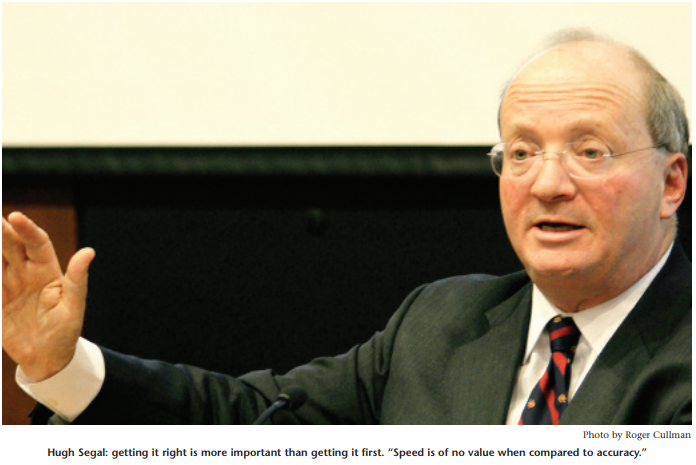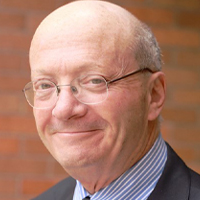
The best option for democracy and accountability is a robust, well-resourced and free press. For a free press to be of value it must have impact.
In an open democracy, the media, its owners and working journalists, editors, freelancers, producers and bloggers get to choose what they cover. I respect that freedom of choice without quibble. But when journalists make one set of choices over another, they are accountable to us as citizens, viewers, readers and listeners. To suggest that the real news may not be only at the official sites where news is expected to happen is surely not a radical, wild-eyed proposition. But to comment that most journalists seem content with covering the official news locations is more challenging. Why would one think that places like the House of Commons, the Senate, provincial legislatures or city councils would be more important sources of real news than a Service Canada office in Hamilton, a customs hall in Montreal, or a college campus in Victoria? Because the latter three locations don’t have press galleries? I find that approach to what matters profoundly lazy and hidebound.
Do ministerial statements, aldermanic diatribes or exchanges in question period not count as news? Well, that is a decision based on the newsworthy merit of what was said, and should not be based only on who spoke, or where they spoke. An opposition questioner who blames the government for every bird that falls from the sky strikes me as the least newsworthy persona — as would the minister who said all is well, the mess was inherited. Usually the engagement could be scripted by a parliamentary intern — and is utterly predictable. So when what is a predictable, scripted, regularly recurring event happens time and time again, and our leading news vehicles treat it as news, we are seeing filler over substance and hollow ritual over consequence. When this becomes the norm, backed up by daily programs rebroadcast each evening that only rehash a hollow series of earlier exchanges, public disengagement from the process is inevitable. Public disengagement produces an apathetic drift to electoral turnout collapse, which delegitimizes government and Parliament itself.
It is not the role of journalists to make politics look interesting and noble on those many days when it is neither. If some politicians choose the petty and the hollow as means of expression, they deserve to be covered as they are. But the larger issue is whether the pettifogging aspects of the daily partisan ritual are really and truly news? Are they news when compared to senior civil service changes, promotions and shuffles, which are lightly reported and rarely analyzed? Are they news when compared to the increase in young girls taking up smoking when a government of Canada, trying to reduce smuggling, has radically reduced the taxes on and thus the price of cigarettes? Are those predictable machinations news when compared to the dynamics at food banks?
It is not the role of journalists to make politics look interesting and noble on those many days when it is neither. If some politicians choose the petty and the hollow as means of expression, they deserve to be covered as they are. But the larger issue is whether the pettifogging aspects of the daily partisan ritual are really and truly news?
It has struck me as an absolute indicator of a political personality’s balance that he or she does not conclude, because they are elected to Parliament or work in the mayor’s office, that these are the most important of all places. The corollary for a competent journalist is not believing that because Parliament or Ottawa or city hall is your beat, it is at the centre of really important news. What is going on in rural communities, school yards, factory lunch rooms and a stockholders’ meeting in Calgary may matter much more. Journalists and the media are the linchpins of freedom and an informed citizenry, whether consumers, investors, patients, students, farmers and all of us well beyond the narrow confines of a self-important capital city. The actual use of real power for constructive ends is as real in courtrooms, livestock auctions, classes, labs, libraries, prisons, boardrooms and union halls. We hear little of that in the news as a result of the domination of the news cycle by the usual suspects in the usual spots. And treating the capitals as centre ice, while the rest of the country is one long special event road trip, seems to be the upending of reality. Judgment and the broad context matter. And so does avoiding the debilitating and limiting constraints of journalistic “group think,” which is made more problematic by the oppressiveness of a digital obsession that values timeliness over accuracy.
The cause of transparency argues that I share my biases with you. I am a child of CBC Radio, where news mattered and was treated as if it did. I come to the media mission and the role of a free press with a mix of idealism about the importance of ideas and criticism, and a very stuffy Tory bias about judgment, balance and integrity. As someone who was in advertising, headed a think tank, and either ran for office or served others who did, I have no naiveté about the role of the advocate, pamphleteer, booster or spinner of lost or popular causes.
As Canadians, we would do ourselves a rare service if we disabused ourselves of any puffed-up notion of our own press freedom or history on the side of courageous journalism. The way the media knuckled under the Trudeau administration during the time of the War Measures Act in 1970 should not be a source of pride or comfort. My recollection is that a few journalists — the late Peter Riley at CTV Ottawa, the late Tim Ralfe at CBC Parliament Hill and George Bain of the Globe and Mail — showed some fight and courage. Otherwise, media and journalist acquiescence reigned supreme. And that kind of “group think,” which can run toward or against any government, politician or individual, seems, during the period since, to still be rather universal. Few write today about how things might turn around for Michael Ignatieff; fewer still in 2002 wrote about how newly elected Alliance Party leader Stephen Harper might unite divided conservatives. We can all think of other examples where the will to conform smothered the will to actually report and analyze.
Media and journalism diminish their salience and credibility when seduced by the twin evils of celebrity journalism and the congenial truth. While these terms were not coined by my good friend Bill Fox, his experience as Toronto Star bureau chief in Washington and Ottawa, and as a war correspondent in Central America, as well as director of communications for a prime minister, helped him to write the most compelling Canadian treatment of these two journalistic evils, in his landmark book Spinwars: Politics and New Media.
When news is only about celebrities, it is not really about the shared experience society provides for masses of people and detaches itself from reality. This debate is about more than trying to make news entertaining, it is about blurring any sense of difference between entertainment and actual news. I have no objection to CBC-TV enjoying and touting the success of its Battle of the Blades. It is unique, inventive and outstanding entertainment; doing it as a headline story on a national TV newscast is an embarrassment.
The “congenial truth” problem is fundamental, because it is about integrity as opposed to stylistic shallowness. What Andie Tucher, the former associate editor of the Columbia Journalism Review, describes as “congenial truth,” “a pact between the reporter and the reader — an understanding of reality that is mutually acceptable,” is the ultimate victory of convenience and marketing over actual news facts. Bill Fox offers numerous Canadian and American examples of this distortion from the pre-1999 era in his book.
Whether they relate to the prospects of a political leader or party, what Canadians may want to believe about the Afghanistan war, the “incivility” of the House of Commons or the “laziness of academics” — all classic areas for congenial truth — matters less than the cost to real journalism and its credibility when what is “congenial” actually replaces what is “substantiated” and, at times, ”unpleasant” truth.
So there is a problem of the absent countervail that produces “go with the flow” journalism, which is about criticism-free content, or “fact, history and context-free” analysis that is little more than a weather report — and markedly short term at that.
The networks of 2000, that called Al Gore as winning Florida, in November raced each other to make timely and inaccurate predictions in the American election. The networks that, for four hours, reported that Major Nidal Malik Hassan, the alleged murderer of soldiers at Fort Hood, had been shot dead at the scene, also put speed ahead of accuracy. Speed is of no value when compared to accuracy.
The McLuhan premise that the “medium is the message” has a lot to do with the potential victory of form over substance; it may be that in terms of audience, shape and scope, how a message is transmitted is important. But to take that premise and confuse it with journalistic purpose is to suggest that the colour of a candidate’s tie or scarf is more important than what he or she believes. That is the kind of belief structure and sense of priority that ends civilizations. We see it often and hear it more among the proponents of news coverage in 120-character tweets, or the digital world’s support of the death of print. The forces of darkness are real, and those of us who care about journalism and freedom would be well advised to not underestimate these dark forces’ strengths.
A few days after the 2000 Florida snafu, while lecturing his journalism class at the University of Georgia, Professor Conrad Fink put it this way: “I’m just an old-fashioned guy who says ‘report what happened, not what you think is going to happen.’” This is what people have a right to expect from a reputable journalist, a reputable news organization. Otherwise, how is one to know if one view of what the news should be has in fact deeply coloured how what really happened was understood and how it was reported — making news a “relative truth” as opposed to “objectively confirmed reality”? This destroys news and the credibility and value of those who report it.
If the “what and why” of a journalist or news report are much less important than the “how,” then quality journalism, offered by experienced writers and broadcasters, matters less than well-coiffed hair, the new CNN-miming news sets, or the figures and physical attractiveness of what the BBC calls “presenters.” It is an absolute parallel with the unedited, “un-mediated blog” — where timeliness and the personality quirks of the “presenter” occupy space that should be filled by quality of research, perspective, balance and competence. There is a price to be paid by the transmitter and recipient; in both cases credibility and trust suffer. Impressions are not confirmed facts. One-source “news” is really only gossip.
CBC Television would have done more for the public broadcaster if the monies spent on set design and promotion had instead been invested in countercyclical news research teams or more bureaux abroad. CBC program management did not make bad choices — they made obvious choices. In promoting its new look, CBC touts “new energy,” “new attitude” and “new name.” Wouldn’t it have been nice to see “more bureaux,” more in-depth coverage” and “more correspondents”?
Newspapers face similar challenges from a looming and much bally hooed generational disengagement from the printed word; succumbing to a McLuhanistic, down-market, digital impulse is hard to resist. Capital markets and publically owned conglomerates make resisting these pressures very tough.
Living in Kingston, I was spoiled by what the Kingston Whig Standard used to be. The “Out of Afghanistan” stories in 1986, for which the author, David Prosser, won a Centre for Investigative Journalism Award, the wonderful work on Revenue Canada, and the hard-hitting stories of illegal drug shipments through Eastern Ontario, spoke to the quirky editors and the staff of considerable talent. It also reflected a committed publisher in Michael Davies, who valued investigating real news as opposed to just the congenial. This is where journalism adds value to the democratic discourse and the informed nature of society. It should be unpredictable, separate opinion from fact, open up vistas and seek undisclosed truths people have a right to know.
Simple path-dependency, where existing news bureaux that have fixed costs mine areas of diminished or alleged importance for news, confusing gossip with news, or mixing small items of interest about celebrities with news of more expansive importance, are all part of a serious media virus.
Simple path-dependency, where existing news bureaux that have fixed costs mine areas of diminished or alleged importance for news, confusing gossip with news, or mixing small items of interest about celebrities with news of more expansive importance, are all part of a serious media virus. And that this path dependency is shaped by the “medium-over-message” McLuhan theology, which suggests that the means of transmittal overtakes what is being transmitted, further runs down the relevance of competence, expertise, editorial judgment and real life experience as journalistic attributes.
Using the digital world to extend brand and reach and to promote print depth is a good idea. Replacing print depth and substance with micro-content digital impressions only threatens print more. And if well-considered and high-quality print shrinks the print market to only the thoughtful, well read and better educated, then that re-profiling, in the tight demographic world of focused advertising and census tract -based print and message targeting, would be a step ahead. Broadening one’s appeal by lowering standards and weakening content dilutes both standards and content — and destroys journalistic equity and brand at the same time.
Economic survival is about the integrity of the brand. That integrity must be about the unique mix of style and content that sets you apart. Competence and objectivity, if you purport to offer “news,” matter. Balance and fairness, if you purport to offer opinion and analysis, count.
In the radio world, modernizing and updating, when confused with dumbing down, does little for the brand and less for the audience. It may be that, like the BBC, CBC Radio should have different signal and program packages that are targeted, as opposed to diluting CBC2 and offending loyal audiences. Digital options and Web-based solutions can help. But shallow content transmitted by podcast does not become less shallow because it is a podcast.
There are some rules that, I submit, would assist in preserving intellectual depth, news credibility and brand expansion for both newspapers and broadcasters. All are about journalism as a pillar of freedom in an open democracy.
- News and opinion are not the same. Mix them without care and you pollute both.
- Define your audience and deliver high quality journalism to it. “Thou shalt not covet a third rater’s audience” should be a commandment for all editors and producers and would assist in defining the standards for the journalists one hires and develops.
- Endless fighting, partisan or ideologically opposed panels of personalities are of value only in very small doses. Kathleen Petty’s rule on CBC Radio’s “The House,” whereby differences of opinion should not be expanded into rants, was a huge step forward.
- Sources matter. A blog is a blog. It is usually unedited and unverified. It may well be a source against which journalists can verify independently whether their “facts” are real. Mixing blogs with news is a cop out. Blogs have a role — in the opinion or commentary section. They are no more news than a political party’s press release. Reporting on what a blog said as if it were news speaks to zero news judgment and a race to find any content that can fill space.
- A public broadcaster is not there to compete with private broadcasters. Public broadcasters were created to fill a void the private market could not fill. That is what public broadcasters are there to do. TVO does it. CBC-TV does not do it anymore. It is superb in many ways, but it is less and less distinguishable on issues of news from private market players. Radio Canada is distinct. CBC Radio is distinct. The most recent CBC TV news re-profiling is the latest evidentiary proof of surrendering distinctiveness and brand particularities. I don’t blame the outstanding CBC on-air broadcasters. I blame the management that lets TV consultants shape a shallow new reality.
- Brand loyalty is not marginal. New generations of readers, listeners and viewers do not, upon arrival, get to change the offering they read, listen to or view. They come to a magazine, newspaper or newscast because of the entity’s existing reputation. That’s why they will stay. Changing the product every time an age cohort turns 14 means the product has no brand equity or integrity. One should not sacrifice those brands’ value on the altar of “new and improved” — the shallowest of advertising come-ons!
- While I can read the Financial Times on my blackberry, it is not the same as reading it in-hand, in its print form. Digital is often, for the least important reasons, a censoring, abbreviating and technical, format-based editor.
- Authenticity matters. Being of and about a place, a set of values, a world-view, is not a parochial weakness. Americans often comment about how pleasantly surprised they are at how much our news broadcasts and newspapers cover other countries, in comparison to Americans’ wild fascination with themselves. This is not about better or worse but about difference.
- Being in and from a place matters. Calgary’s approach to homelessness is more creative, humane and courageous than Toronto’s. We need to know why. Communities are where we go to school, work, invest, sell, buy, worship, live and die. The view of a community and its news shapes its self-image and aspirations. The view from a community of the larger world also matters a great deal. We surrender that to the digital homogenizers at great cost to brand, identity, equity and community.
- Cost pressures are not new or more dynamic than they were in the past. The same technologies that put digital media pressure on the printed word also make photography easier and speed up transmitting reports, editing, publishing and printing. Revenue expectations driven by public capital markets are real. But that does not always make them realistic, if quality is to count. Firing older reporters, letting editorial and news rooms shrink, moving to the unedited and immediate news model because financial analysts in their 30s had a view of your stock’s relative performance, may seem unavoidable. It is neither rational nor competent. It may well be that we need to look, not at media concentration issues, but at media ownership restrictions.
- The demographic reality has two sides to it. The oncoming generation has digital and Web proficiency and the less young have a more mixed disposition.
My exposure to young people in every class I have taught at the Queen’s School of Policy Studies has shown me a couple of things.
First, the comfort and range of digital media do not dilute a search for quality, trustworthy sources and justifiably important facts and analysis. Low quality, cheap sensationalism and rigid shallowness are apparent to the thoughtful, younger digital consumer, just as they are to the older Financial Times reader.
Second, they do not set aside the printed word. And whether consumed in hand, on the web, on a Kindle or in its analogues, the printed word still matters.
And, as we know how older people feel about the same considerations in their morning paper, we should understand that, in the end, the shallow, cheap hit and congenial, celebrity-inebriated content have nowhere of value to hide.
Journalism that matters and that informs, uncovers, empowers and liberates societies and citizens is about the integrity of content. I do not look to FOX for news integrity. I look to FOX for the American neoliberal, neocon view of the world. It’s not news I would ever trust. I know that Lloyd Robertson reports the news as he believes it to be — not how he would like it to be. Trust matters. Competence counts. Integrity is essential.
Journalism, reporting the facts and informing the public, in a truthful, factual, verified and balanced way, are not lofty goals. They are the standards of the standard bearers of the profession. There are countries where attempts to reach these goals are viewed as criminal and result in imprisonment and worse. I believe the profession owes it to those fighting for the right to report to set their standards high. My bias is to aim high. I believe many in journalism still share that same bias.
Excerpted from a speech to the Canadian Journalism Foundation at the University of Toronto, November 23, 2009.
Photo: Shutterstock









